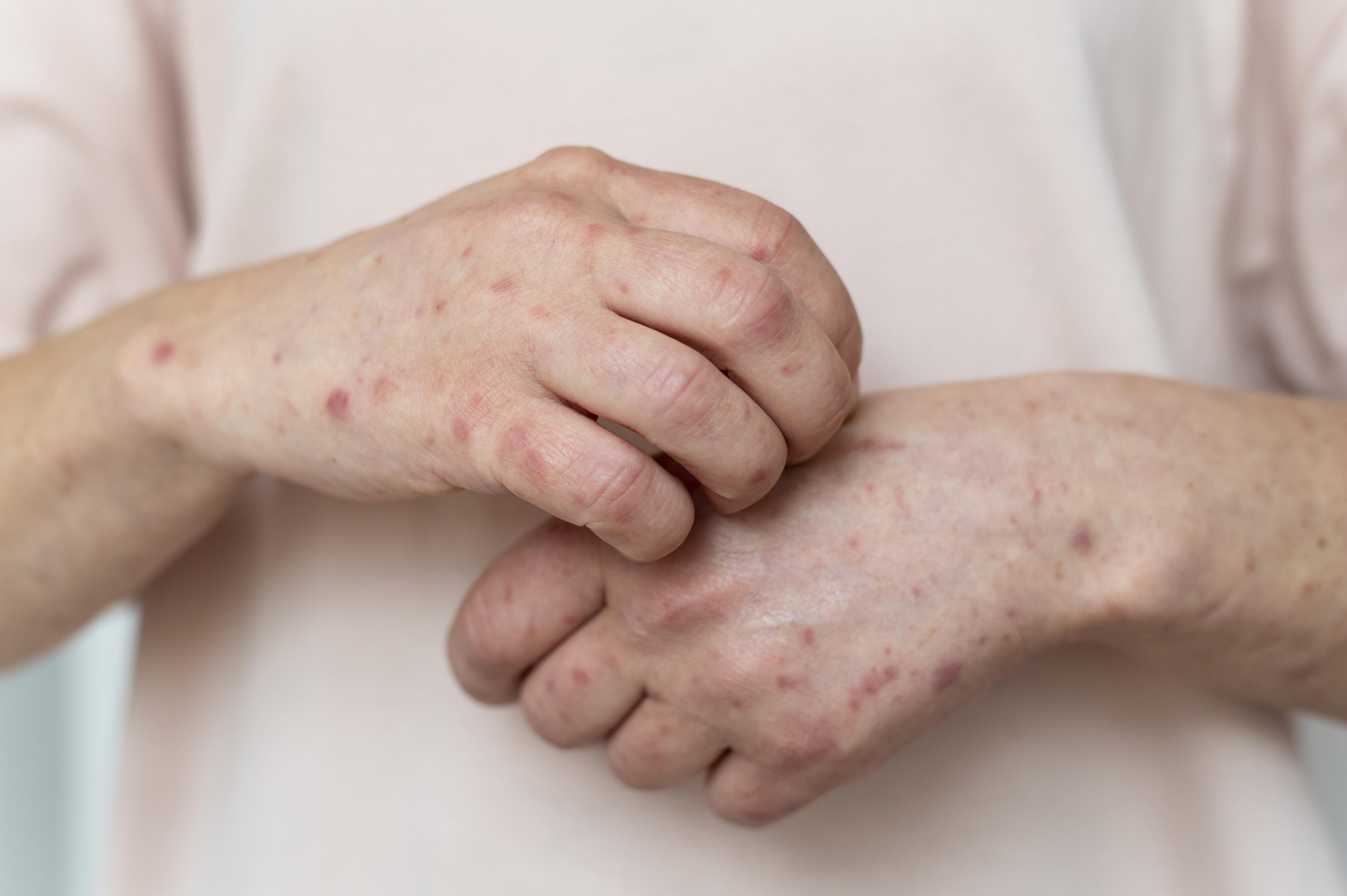Psoriasis is a chronic autoimmune disorder that causes the rapid multiplication of skin cells. This unwanted growth of cells causes scaling on the skin’s surface. Inflammation and redness around the scaled boundary are indicative of psoriasis. The exact cause of psoriasis is still unknown, but it is related to an immune system problem. There are several types of psoriasis, but the most common is plaque psoriasis. Symptoms of psoriasis include thick, red, scaly patches on the skin, itching, and burning.

How psoriasis initiates?
The exact cause of psoriasis is not fully understood, but genetic and environmental factors are involved. Research suggests that psoriasis occurs due to discrepancies in the immune system.
The immune system helps protect the body from invasions of infection and disease in the body. However, in psoriasis, the immune system mistakenly attacks its healthy skin cells. This self-attack causes the skin cells to grow too quickly, leading to the buildup of silvery scales and patches on the skin.
Certain genetic factors also play a role in the development of psoriasis. People with a family history of psoriasis are more likely to develop the condition.
Environmental factors, such as infection, injury to the skin, mental stress, and certain medications, can also trigger or worsen psoriasis.
What are the three primary symptoms of psoriasis?
- Thick, red, scaly patches on the skin: The most common symptom of psoriasis is the appearance of thick, red, scaly patches on the skin. These patches are called plaques and can appear anywhere on the body. They are most common on the scalp, knees, elbows, and lower back.
- Itching and burning: The skin affected by psoriasis can be super itchy and painful. The itching can range from mild to severe and is the chief source of discomfort.
- Changes in Nails: In some cases, psoriasis can affect the nails, causing them to become discoloured, thick, and even brittle. Pitting, ridging or detachment of the nail from its bed may also occur. Changes in the nail be a sign of psoriasis. In ayurveda, such indications come under “Purva roop.”
It is necessary to get such preliminary symptoms evaluated by a psoriasis doctor in Mohali. Dr Jyotiraditya is an ayurvedic doctor who treats psoriasis with panchkarma. He is available in the Nidanam wellness clinic.
Can ayurvedic treatments cure psoriasis fully?
Ayurveda is a traditional system of medicine that originates from India and incorporates various herbs and dietary and lifestyle changes to treat multiple health conditions.
Ayurvedic practitioners believe that psoriasis results from the accumulation of toxins in the body. The imbalances in the three doshas (vata, pitta and kapha) may also result in psoriasis.
Some Ayurvedic practitioners may recommend a combination of herbal medicines, dietary changes and lifestyle modifications to improve symptoms of psoriasis.
It is necessary to consult a qualified Ayurvedic practitioner or a dermatologist before starting any treatment. Dr jyotiraditya is an ayurvedic doctor who treats psoriasis in Panchkula.
Which Ayurvedic medicine and herbs help to treat psoriasis?
There are several Ayurvedic herbs and supplements used to treat psoriasis. A few of them are as follows:
- Turmeric: Turmeric contains a compound called curcumin, which has anti-inflammatory properties. It can be taken as a supplement or applied topically to the skin.
- Neem: For centuries, Indians uses neem herb to treat skin-related issues. Neem has anti-inflammatory, antiviral, and antifungal properties. Neem oil or neem leaf extract is applied topically on the affected skin area. Neem supplements also act wonderfully with several skin issues.
- Guggulu: Guggulu is a resin having anti-inflammatory and immune-modulating properties. It can be taken as a supplement or applied topically to the skin in combination with other herbs.
- Triphala: Triphala is a blend of three fruits, harad, baheda and amla. Triphala has antioxidant and immune-modulating properties. It can be taken as a supplement or applied topically to the skin. It also helps in the detoxification of the body.
- Mahamanjisthadi kwath: Mahamanjisthadi kwath is a popular ayurvedic medicine composed of several herbal ingredients and consumed as a decoction to treat skin issues.
What is the role of panchkarma in treating psoriasis?
Panchakarma is a set of five therapeutic procedures that cleanse and detoxify the body. Dr Jyotiraditya of Nidanam Wellness clinic believes that panchakarma can be beneficial in treating psoriasis. It helps by removing toxins and restoring balance to the doshas. The five procedures that makeup panchakarma are:
- Vamana karma: This procedure involves medically inducing vomiting to remove toxins from the body.
- Virechana karma: This procedure involves medically purging toxins from the body.
- Nasyam karma: This procedure involves administering medicated oils, decoction or herb extract through the nostrils to cleanse the blocked sinuses.
- Basti karma: This procedure involves administering medicated oils or decoctions through the rectum to cleanse the colon.
- Raktamokshana: This procedure involves the therapeutic removal of blood through venesection or leeching.
Nidanam Wellness Clinic managed by Dr Jyotiraditya, a psoriasis doctor in Panchkula, offers all the traditional panchkarma treatments.
FAQ's
Can people with psoriasis use hair dye or other cosmetics?
People with psoriasis can use hair dye and other cosmetics but with caution. They should use cosmetics and hair products labelled as “hypoallergenic” and “fragrance-free.” They should also avoid using hair dyes or chemicals that contain alcohol, which can be drying and irritating to the skin. Take a patch test before using them.
Does what I eat affect my psoriasis?
While diet alone cannot cause psoriasis, some foods may trigger or worsen symptoms in some people. Studies have shown that certain foods like gluten, alcohol, processed foods, and red meat may flare up the disease. Eating a healthy, balanced diet rich in fruits, vegetables, lean protein, and whole grains may help to reduce inflammation and improve overall health in people with psoriasis.
Dr. Jyotiraditya Agarwal

Contact Us
Testimonials

Rahul Sharma
CIVIL ENGINEER
I am very satisfied with my back pain problem that is almost 100 % resolved by treatment done at Nidanam. My problem was almost 8 years old. I had consulted so many doctors but in vain… then came to know about this clinic and now my back pain is History.


Aditi Bose
DESIGNER
I am extremely happy with my Hair Treatment done by Dr. Bhavana. I was almost on the verge of getting bald. I started my Hair treatment at Nidanam and it took me 6 months to find my scalp full of hairs back. I am Very very happy with the results.


Pulkit Rastogi
CUSTOMER
I lost almost 27 Kg here at Nidanam. They don’t make you starve nor make you exercise hard. With their specialized diet plans along with weigh loss techniques I was able to shed off those Kgs..
